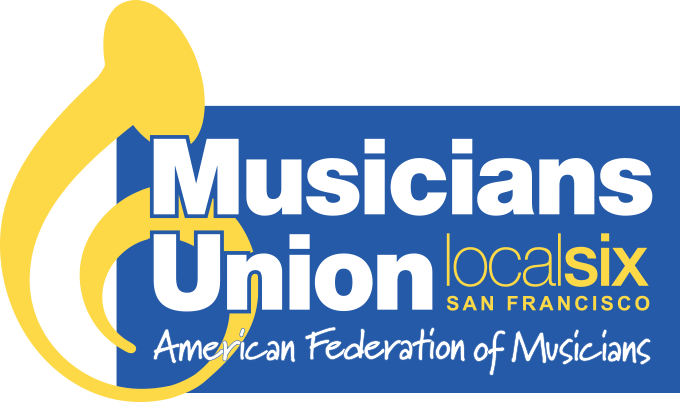THE REAL VOCAL STRING QUARTET
Interview with Alex Walsh
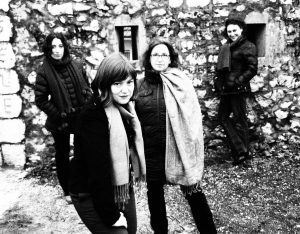
THE REAL VOCAL STRING QUARTET:
From left: Alisa Rose, violin & voice, Dina Maccabee, viola & voice,
Irene Sazer, violin & voice, and Jessica Ivry, cello & voice.
The Real Vocal String Quartet started in 2004 when Irene Sazer, a violinist and original member of Turtle Island String Quartet, decided she wanted to perform material she had written for violin, cello, and voice. She found Jessica Ivry, a cellist, and soon they expanded to a quartet, adding Dina Maccabee on viola, and Alisa Rose on violin.
Not only are they all highly trained string players, but they all sing, improvise, and arrange music. “We all have very wide interests, musically,” says Irene, “That’s really why we’ve continued—it always is developing and blossoming into new musical areas.”
The group has released two CDs, and played many concerts and tours. They recently toured parts of Eastern Europe and the Balkans through the US government-sponsored American Music Abroad program. In 2010, they recorded with Canadian singer/songwriter Feist, and performed with her on the Tonight Show. I interviewed them recently at the Real Vocal String Quartet World Headquarters in Berkeley.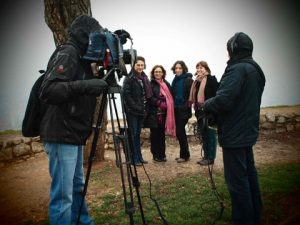
And.. action! RVSQ in Sarajevo.
AW: I heard you went on a tour recently?
Jessica: We went on this really great tour sponsored by the US State Department called American Music Abroad. It’s a program that sends musicians from the states overseas to play for underserved communities, where they don’t have much access to live music. We played for both music students and non-music students, as well as adults. We went to five countries in one month: Azerbaijan, Macedonia, Bosnia-Herzegovina, Latvia, and Lithuania. We did a lot of workshops and concerts, and we just got back December 15th.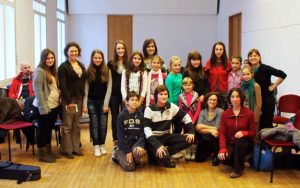
Students and teachers, Pavarotti Music Center, Mostar, Bosnia-Herzegovina.
AW: And you’re still recovering…
Dina: We are—definitely still recovering. We put out a record right before we left, so it’s a lot all at once.
Jessica: We had a kickoff concert through SF Performances “Salons at the Rex” Series, literally the day before we got on the plane.
Irene: One of the things we did in that concert, which was suggested by the State Department, was to arrange a piece of music from each country that we were to visit. We arranged and played a folk song from each of those countries, and then we performed them while we were there. It was a beautiful way to connect with the audiences.
AW: Wow. Was that a big deal to get that gig? Did you work for it for years, or did it just happen?
Dina: We actually didn’t know about it until our publicist heard about it the day before the application was due. We put a fair amount of work into the audition involved, doing a demonstration of what you would do for an educational presentation. In some ways, we’ve been working on that gig for seven years without knowing it. We draw on different American roots music, which is what they’re looking for, and we also draw on jazz and classical music, so they were excited about us.
Alisa: We’re very American in that we pull from a lot of different sources. There are so many musical traditions here. When we visited Macedonia, we did hear Macedonian traditional music that definitely was not a hybrid of eighteen things.
Dina: Later we learned that the American Music Abroad program has a very long history, going back to the fifties and the cold war. And also, I think that three or four hundred groups applied this year, and they only chose twelve. So, it’s definitely a big deal. It’s an institution, that program, which we didn’t fully realize until we went.
Irene: We were hosted by the American embassies in every country. We didn’t have to book our own gigs, they booked them for us, which was so nice. And we each got our own hotel room!
Alisa: It felt very meaningful to be there, and play for people. They were really excited to meet Americans, and really accepting of our music.
Dina: There was an aspect that we’re from a line of creative Bay Area string quartets, like Turtle Island and Kronos. They don’t have that in Macedonia, so it was perhaps more new and different and eye opening for them than for an audience in San Francisco or Berkeley.
Irene: Although the mission was to play for people who didn’t have access to live music—maybe sometimes that mission was live American Music.
Jessica: They had access to tons of pop music on the radio, but certainly not the kind we’re doing. So it was a very big honor.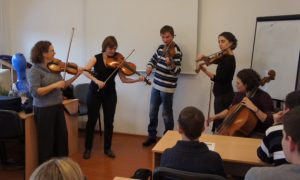
Teaching a class in Vilnius, Lithuania.
Irene: We just got an award from the City of San Francisco, signed by the mayor, as a thank you, for being cultural ambassadors.
* * *
AW: How did you get together? Did you audition for each other? Or did you just say, oh, you’re in?
Jessica: I don’t think there was an official audition.
Dina: I had an audition.
Jessica & Irene: Did you really?
Alisa: So did I.
Irene: Well, you all passed!
Jessica: What was the audition? I can’t remember…
Alisa: It was like, ‘let’s play fiddle tunes’.
AW: Was the personality mix just as important as the playing?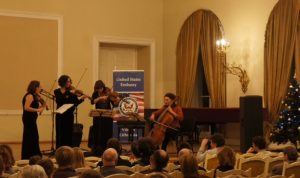
Performing at the Lithuanian Academy of Music and Theatre,
Vilnius, Lithuania.
Dina: There’s an attitude about it—it’s actually funny when you think about it—there’s not that many people who would want to do something this…bizarre. Most string players don’t sing and play at the same time. Most string players don’t arrange world music.
Jessica: I bet after years of being together, a lot of famous quartets might say, ‘We need someone with this kind of personality’, but when we started it wasn’t as clearly defined. It was like, ‘We’re putting something together…’
Alisa: We’re a special breed of string players who might take a Cajun tune, or an old-time tune, or a pop tune, and slow it down half speed and spend hours learning it, which isn’t part of our conservatory training, but it’s part of our training now.
Castle, Sigulda, Latvia.
Dina: It’s an outlook on life.
Jessica: Our conservatory training has really helped us to do that. We’ve all played in bands, pop bands, and I don’t think that level of analytical detail always happens. And it sometimes needs to happen. And sometimes it absolutely does not, and that’s why pop bands are so great!
Irene: And also it needs to happen within the context of a string quartet because, we are, sometimes, trying to BE a band. We have to be a rhythm section, and there has to be a lot of attention on how to fill it out. It’s not like we’re playing drums and bass, we have to create that structure with what we’ve got.
AW: When one person brings something in, does it totally change by the end? Or does it depend.
Dina: It depends on how fleshed out it is. How many other ideas people have.
AW: And have you said, I have a little piece, now what’s your little piece? Do you put things together that way?
Dina: We’ve done that. We did that with one of the tunes from Azerbaijan that we arranged.
Alisa: That was like three ideas glued together.
AW: What’s your approach to improvisation?
Jessica: Some songs have solo sections. Irene started this thing we’ve worked out, called NOW. We play four short little movements that we each start. It’s a free improv and it can kind of go anywhere.
Alisa: Sometimes it sounds like Bartok, and sometimes it sounds like a fiddle tune.
Irene: And sometimes they sound like both. It really is kind of like we’re a string quartet, and we’re a string band, and we sing. We’ve all been improvising for a really long time. It’s something I always want to work on and get better at, but it’s also part of our language and very natural to all of us.
Jessica: We’ve done some good workshops about alternative string playing.
Alisa: That’s one of our specialties.
Irene: We have some help with booking now and we’re playing more and more with colleges and college students, and opening that door to improvisation, which is really easy for them to do, but they just don’t know how to take those steps. It’s really fun.
Dina: Musically, we’re offering things that improvisers have worked on for forty years, or forever.
Alisa: Classical string pedagogy doesn’t actually encompass a lot of improvising, although it doesn’t have to be a separate thing. Learning technique and learning all of the important foundational things is important.
Dina: A lot of those tools we’ve found, in working together, just have to do with basic musicianship. You know, connecting theory with what you play on your instrument. That is weirdly not a part of classical string pedagogy. I have students all the time who come at various levels. They can get around on the instrument, but they either don’t know what the notes are, or they don’t know what a triad is, or they don’t know how chords function at all—because you can get through reading music and through orchestra without learning that stuff. You have to take theory in school but that doesn’t mean it’s connected to your playing. It’s completely isolated.
Irene: I like to call it applied theory.
Dina: For whatever reason, that gets left out. So we have fun working with that. Not like we do a major theory-based thing, but we’re just trying to open peoples ears and help them not be afraid of making sounds that aren’t written down on a piece of paper.
Irene: And I think it gives people a less of a feeling of distance from composers, like, they can do it too, and this is the process that people experience when they write music. And I say this at almost every interview, but REALLY, we’re connecting to what USED to be part of string playing, which was improvising!
Dina: And all classical playing, before it was classical, when it was just music.
Irene: I just went to represent the band at ASTA, the American String Teachers Conference, which was in Providence, Rhode Island. I went on behalf of the band, ran an improv workshop, and I talked to a lot of people. That is really important to us. We love to educate, all levels—kids, teens, college students, grown ups—I think it’s safe to say we all really love teaching and educating.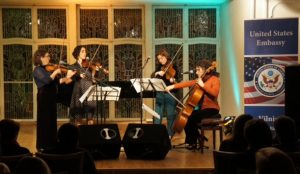
Performing at the Kėdainiai Multicultural Center, Kėdainiai, Lithuania.
Alisa: As well as playing.
Jessica: There’s one more thing I can add. Alisa, Dina, and Irene have all had pieces published, written for string quartet. We’ve done some recording sessions of them, and some of them are tunes that we still play. People who actually play in string quartets can buy them, so that’s really neat.
Irene: At ASTA, a bunch of people were like ‘Oh yeah, I’ve played your charts, my students play your charts.’
Jessica: We should bring those to shows. If you like what you hear today, you can play it!
Since this interview, The RVSQ was honored to play the opening set for the Kronos Quartet at Stern Grove. They’ve continued to work hard promoting their latest CD, Four Little Sisters, as well as writing new material for their next recording.
Visit www.RVSQ.com for the latest info.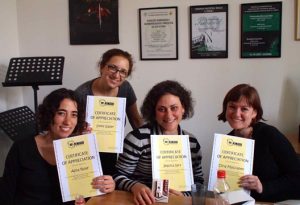
Holding Certificates of Appreciation from Zenica, Bosnia-Herzegovina.
